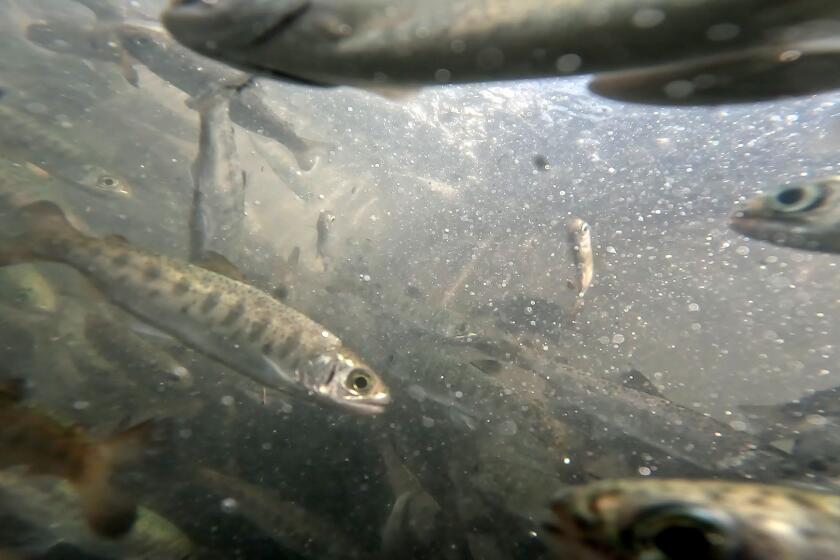Biotech Firm Rocked by Blasts
Law enforcement officials believe animal rights activists may have been responsible for two homemade bombs that exploded early Thursday morning at the headquarters of biotech giant Chiron Corp.
The explosions, one at 2:55 a.m. and the other at 4:10 a.m., caused no injuries and minimal damage, including a few broken windows. At 7 a.m., a third blast was heard as authorities blew up a 5-gallon bucket on the opposite side of the grounds. The bucket was later determined to have contained sand or paint, company officials say.
Alameda County sheriff’s officials said the “crude pipe bombs” had been detonated with egg timers. The devices appeared to have been left at ground level outside Chiron’s international headquarters, just across the bay from downtown San Francisco.
The bombings were being investigated by the FBI and the federal Bureau of Alcohol, Tobacco, Firearms and Explosives. Federal officials said they had not ruled out characterizing the incident as “domestic terrorism.”
“That is definitely within the realm of possibility,” said LaRae Quy, an FBI agent in San Francisco.
With 2,000 workers, Chiron is the largest employer in Emeryville, a city of 7,000 at the eastern foot of the San Francisco-Oakland Bay Bridge.
Stop Huntingdon Animal Cruelty condoned the bombings on its Web site but did not take responsibility for them. The group has been targeting British-based Huntingdon Life Sciences, a company that conducts tests on laboratory animals.
“We certainly don’t tell people to go out there and engage in illegal activities, but if it happens, we applaud it,” said Andrea Lindsay, a member of the group, in a telephone interview. “We’re happy to see any activity that causes economic sabotage to Huntingdon and its supporters, as long as no humans or nonhumans are hurt.”
Chiron officials said the corporation has contracted in the past with Huntingdon to perform animal experiments on medical compounds it is developing. Spokesman John Gallagher said, however, “that Huntingdon is not currently conducting animal research for us.”
He said the bombings had followed a long series of “harassment incidents” on the part of animal rights activists against Chiron executives that began in May and “have escalated this month.”
Those incidents, targeting Chiron employees in the Bay Area and Seattle, have included etching slogans such as “Puppy Killer” in acid on the windshield of a Chiron executive’s car, dumping rotten fruit at the home of another company officer and holding a raucous 3:30 a.m. protest on an upscale suburban street that is home to a third official.
Martin Forrest, Chiron vice president for corporate communications, said several “stink bombs” had been left in employees’ mailboxes. And he said protesters had staged demonstrations at company property in Seattle.
Forrest denied a report that activists had flooded Chiron with several thousand e-mail messages the day before the blasts.
“We receive a high volume of spam and computer viruses every day, but to the best of my knowledge there was nothing that specifically related to these explosions,” he said.
Gallagher said the harassment had prompted the company Wednesday to send an e-mail to all employees in the United States “to alert them about what was going on and encourage them to follow all security procedures.”
Quy confirmed that the FBI was looking at animal rights groups “as a definite possibility” in the explosions. She added that the agency had not ruled out other possible suspects, including “disgruntled employees.”
Lindsay of the Stop Huntingdon group called the bombings a “justifiable case of economic sabotage” that “sends a message loud and clear to customers of Huntingdon that they cannot go about business as usual without repercussions.”
The group’s Web site, similar in design and content to the Web site of animal rights activists who condoned a series of attacks against a Sonoma producer of foie gras earlier this month, contains a number of “anonymous” postings taking responsibility for the earlier actions against Chiron employees.
The entire opening page of the Web site on Thursday consisted of Stop Huntingdon’s “official statement” on the Chiron blasts.
According to the statement, Huntingdon “has been exposed in five undercover investigations revealing workers punching puppies in the face, dissecting live primates, falsifying research reports and violating Good Laboratory Practice laws over 600 times.”
Chiron spokesman Gallagher defended Huntingdon and other contract partners.
“We work with labs to make sure that the work is carried out according to stringent standards -- that animals are treated in the most ethical manner possible,” he said. He said that Chiron is legally required to perform animal tests on its “experimental compounds.”
Gallagher would not disclose, “because of security concerns,” whether the company conducts the tests itself at its Emeryville premises.
Chiron executive Forrest had a message for the bombers: “We’re doing some very good work here. The results benefit patients around the world.”
The corporation, with annual sales of more than $1.1 billion, has a solid business in vaccines and blood-testing equipment.
Its main products are a meningococcus vaccine sold in Europe and Australia, and blood tests for HIV, hepatitis B and hepatitis C. It is also working on developing cancer treatments.
After news of the bombings was reported, Chiron’s stock dipped, but it ended the day up 44 cents at $50.40 on Nasdaq. Chiron shares have risen about 35% this year.
Reassured by company officials, employees began reporting for work just after noon at Chiron headquarters, a several-acre campus of low-slung buildings. Authorities cordoned off a square block with police tape.
One worker leaving the campus was noticeably unshaken. “It’s really just a couple of broken windows,” said the man, who declined to be named. “No one got on company grounds, as far as we know.”
Nonetheless, Forrest said security had been increased at the headquarters and for those who have been the subject of harassment.
“This is quite disturbing and unsettling for all of us,” he said. “We take this very seriously.”
Times staff writer Denise Gellene contributed to this report.







